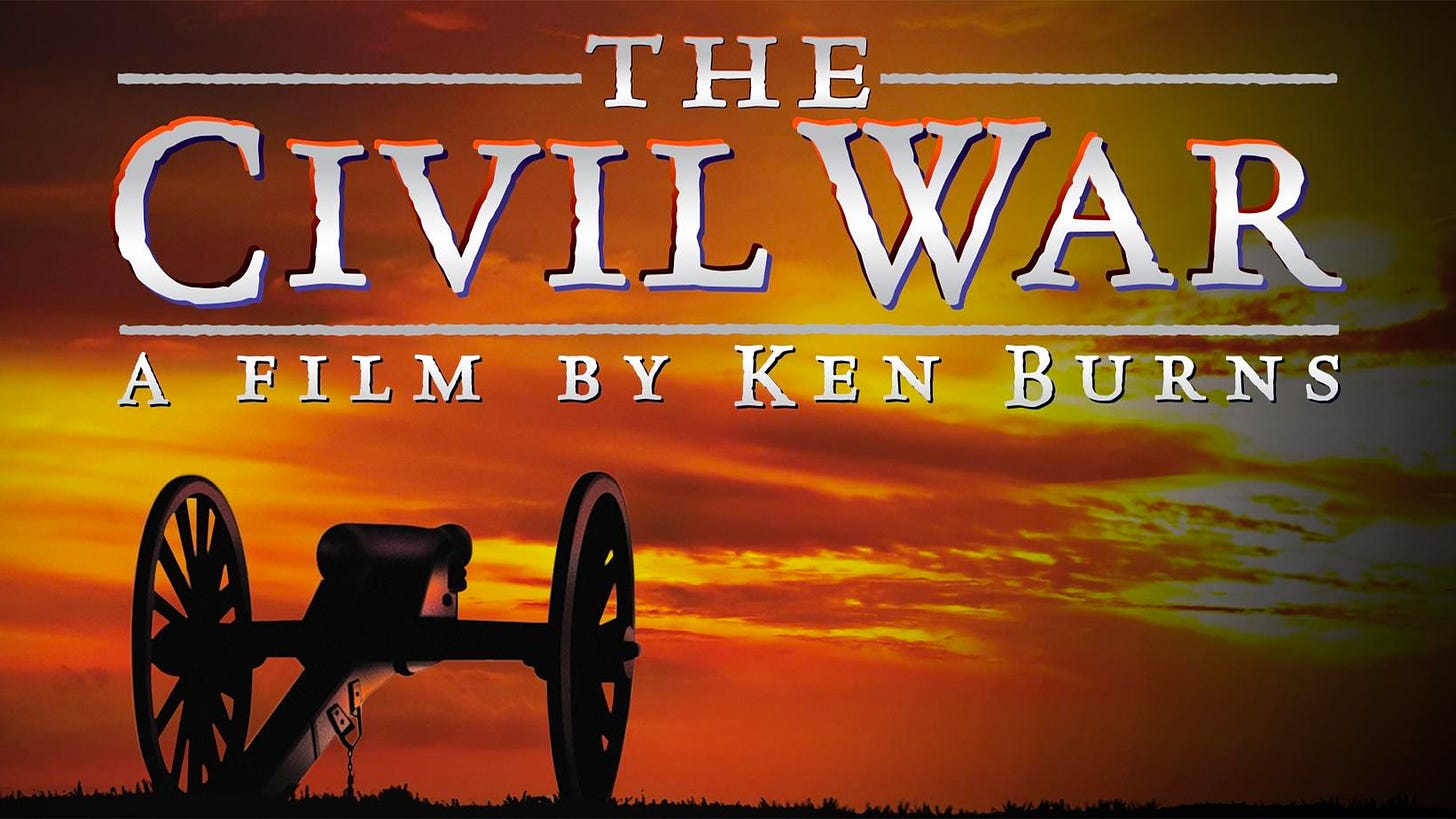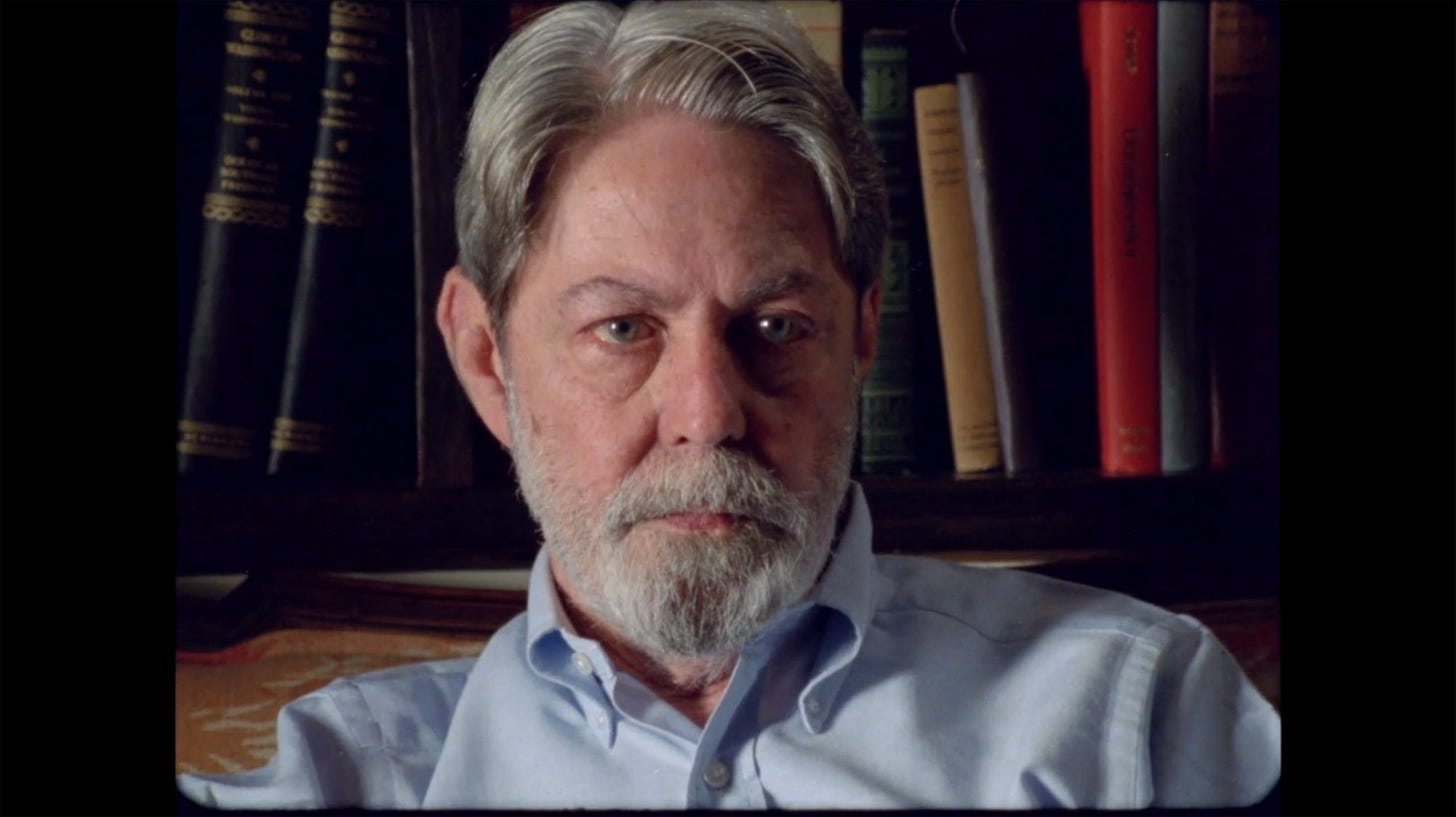The other day on twitter I was asked if it is worth watching Ken Burns’s documentary, The Civil War, which aired on PBS in 1990. In recent years, the series has come under intense criticism, especially in light of the ongoing debate about Confederate monuments. In 2020 the series was re-aired on PBS to mark its 30th anniversary and it remains popular to this day.
But is it still worth watching given the criticisms? In this short series I am going to address some of its flaws and strengths. I am going to wrap up this series with some thoughts about whether we need a new Civil War documentary.
One of the most popular criticisms of the series is that Ken Burns ignores the importance of slavery or that it promotes a Lost Cause view of the war.
To be fair, the series does place slavery at the center of the narrative at different points, especially in Episode 1, which focuses in large part on the years leading to the war. Talking heads such as historian Barbara Fields and the overall narrative devote substantial time explaining the unraveling of slavery midway through the war as well as Lincoln’s own rocky road toward emancipation in 1862.
Even with all the attention that slavery and emancipation receive throughout the series, however, a clear Lost Cause narrative is discernible. It is given voice by none other than the writer Shelby Foote, who dominates the series as the most vocal talking head.
To put things in perspective, Foote spoke 7,653 words compared to the second highest speaker, who spoke 1,112 words. As a total percentage of words spoken by talking heads, Foote’s commentary reached 73.5%. [It is important to remember that this does not include what was edited out of the final script.]
Foote’s commentary is worth exploring.
Remarkably, in all of Foote’s commentary he referenced slavery in one form or another only three times. Never once did Foote reference slavery as having anything to do with secession/the cause of the war or as a motivating factor for Confederate soldiers at any point during the war.
Early on in Episode 1 the long-term cause of the war is rooted in the failure on the part of the “Founding Fathers” to come to terms with slavery. Notice how Foote’s commentary sits uncomfortably alongside comments made by narrator David McCullough, Barbara Fields and John Jay Chapman.
Narrator – Some slaves refused to work. Some ran away. Still, blacks struggled to hold their families together, created their own culture under the worst of conditions and yearned to be free.
Barbara Fields Interview – If there was a single event that caused the war, it was the establishment of the United States in independence from Great Britain with slavery still a part of its heritage.
Shelby Foote Interview – It was because we failed to do the thing we really have a genius for, which is compromise. Americans like to think of themselves as uncompromising. Our true genius is for compromise. Our whole government’s founded on it. And it failed.
John Jay Chapman – There was never a moment in our history when slavery was not a sleeping serpent. It lay coiled up under the table during the deliberations of the Constitutional Convention. Owing to the cotton gin, it was more than half awake. Thereafter, slavery was on everyone’s mind, though not always on his tongue.
Narrator – By the time the nation was founded, slavery was dying in the North. There were doubts in the South, too, but few could conceive of any alternative. Thomas Jefferson of Virginia said maintaining slavery was like holding a wolf by the ears: you didn’t like it, but you didn’t dare let it go.
The closest Foote comes to referencing slavery as relevant to secession and war comes a few minutes later in the film.
Shelby Foote Interview – Southerners would have told you they were fighting for self government. They believed the gathering of power in Washington was against them… When they entered into that Federation they certainly would never have entered into it if they hadn’t believed it would be possible to get out. And when the time came that they wanted to get out, they thought they had every right….
Southerners saw the election of Lincoln as a sign that the Union was about to radicalized, and that they were about to be taken in directions they did not care to go. The abolitionist aspect of it was very strong, and they figured they were about to lose what they called their property and faced ruin.
There is a tension in Foote’s referencing of self government and the “abolitionist aspect” of Lincoln’s election that is never resolved if you follow his commentary through each episode. In fact, for the remainder of the series Foote steers clear of these tough questions entirely. Consider the following examples.
Shelby Foote Interview, “The Lincolnites” – Early in the war a Union squad closed in on a single ragged Confederate, and he obviously didn’t own any slaves and he couldn’t have much interest in the Constitution or anything else. They said, “ What are you fightin’ for anyhow?” they asked him, and he said, “ I’m fighting because you’re down here.’ Which was a pretty satisfactory answer.
Shelby Foote Interview, “Kiss Daniel For Me” – The answer a Southerner would give you as to why are you fighting if you were a Northerner, he would say, “I’m fighting ‘cause you’re down here.” He was being invaded and he fought as he thought, to defend his home. Lincoln had a much more difficult job of sending men out to shoot up somebody else’s home. And he had to unite them before he could do that. And his way of doing it was double. One was to say the Republic must be preserved, not split in two. That was one. And the other one he gave them as a cause: the freeing of the slaves.
Shelby Foote Interview, “1863: The Universe of Battle” – The Confederates…marched through Maryland and on into Pennsylvania. It’s very handsome country there. The barns are magnificent and the green fields and everything and the people watching these Confederates go by. And there was a black body servant in the column and they stopped, just a halt, and the people in the house asked him what he thought of this country around here. And he said, “This is beautiful country, but it doesn’t come up to home in my eyes.”
Regardless of whether Burns acknowledged this when it was first released in 1990, Foote played a specific role in this documentary. His primary responsibility was to comment on military matters and he did this quite effectively from telling colorful stories about the experiences of the common soldier in battle to waxing poetic about Nathan Bedford Forrest.
At the time he pushed a narrative that was incredibly popular for people who, for whatever reason, would rather hold on to a memory of the war that is void of the story of slavery and emancipation. What’s left is a popular narrative of brave soldiers fighting for their respective causes, even if those causes remain blurred.
Shelby Foote captured the imagination of much of the country with his southern drawl, but Burns ought to be able to acknowledge, all these years later, that the amount of air time he was given, likely allowed certain viewers to slip through with a confused understanding of slavery’s importance.
In many ways this documentary was released as the nation’s collective memory of the war was in transition—a theme I will return to in the next installment. The Civil War captures that Lost Cause/nostalgic view of the war even as it anticipated the ascendancy of an “emancipationist” narrative that would help to define the Civil War 150th commemoration and eventually serve as a justification for the removal of Confederate monuments.
In fact, without Foote’s presence this documentary clearly highlights slavery as central to many aspects of the war. Some of you may be surprised to hear that the Sons of Confederate Veterans denounced this documentary, when it first aired, for the amount of attention it gave to slavery, emancipation, and Black soldiers.
In Part 2 of this series I am going to discuss aspects of this documentary that I really like.






As you point in your reply to Brendan the one way to watch it is to emphasize the people other than Foote. In other words, ignore Foote with his folksy style. For me, the worst comment, in retrospect, was his “compromise” comment. I remember Ta-Nehisi Coates addressing Foote’s comment several years ago and excoriating him.
Perhaps you will yet address this, but one of my objections is to how overwhelmingly _military_ the series is. That's what sells, of course, and I find that material as interesting as anyone, but the overwhelming majority of Americans and secessionists did not experience the war as combatants, and they get horribly short shrift in the series. Thanks for writing about this!